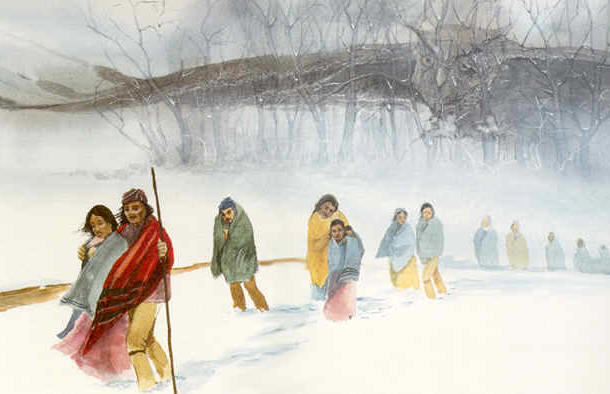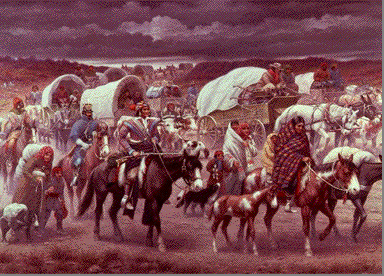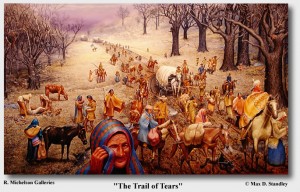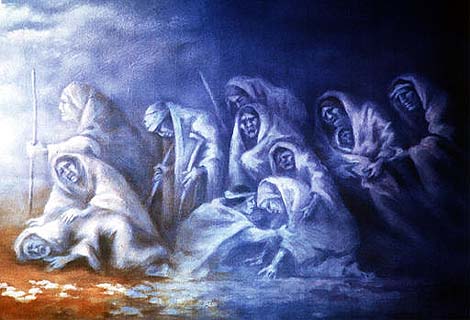Crosswalk and the Christian Post published this article last week but I want to put it up here too. The American Family Association refuses to comment officially on the supremacist views of Bryan Fischer but I believe they should. In this article, I quote some evangelical leaders who comment on Fischer’s views. Here is a powerful one:
Fischer’s revision of history is offensive to Rev. Falls. Referring to Fischer’s articles, Falls asserts, “This kind of stereotyping has traditionally been used to de-humanize people so they can be treated differently. I believe Native Americans are no different than any other people created in the image of God.”
Read on…
Should evangelicals apologize to Native Americans?
It is past time for evangelicals to express remorse and regret to Native Americans for the mistreatment they experienced at the hands of Christians throughout the history of the nation. Although President Obama signed a resolution of apology in 2009 on behalf of the nation, evangelical groups should also follow suit.
It is a sad fact of American history that Christianity, at times, conspired with the government to colonize and nearly eradicate a proud and free people. Sadly, in the present, those wounds have been reopened by a representative of that same belief system, in effect, blaming the native people for their demise. In February, Bryan Fischer, Issues Analyst for the American Family Association wrote on the AFA website that Native Americans were “morally disqualified from sovereign control of American soil” because of “superstition, savagery and sexual immorality.”
Fischer followed up by suggesting that Americans should be proud of the “displacement of native American tribes.” Finally, he wrote that if the native people had converted to Christianity, like Pocahontas did, then “their assimilation into what became America could have been seamless and bloodless.”
Such assertions are offensive to Native American Christians. One such leader, Rev. Emerson Falls, counters Fischer, telling me that some Indian tribes, such as the Cherokee, assimilated into white Christian ways only to be displaced by federal policy at gunpoint and marched from the deep South to Oklahoma during the Trail of Tears (1838-1839). Falls added, “It was only after their forced removal on the Trail of Tears that they began to question the validity of Christianity.”
Ironically, Fischer’s assertions about Native Americans come at a time when some Christian groups are attempting to address wounds, never fully healed, among Native Americans.
The first weekend of March, Southern Baptists hosted a conference in Oklahoma called “The Gathering” where Native American Christians reflected on reasons why their peers are not more receptive to Christianity. Randy Adams, Church Outreach Director of the Baptist General Convention of Oklahoma, described barriers past generations of Christians created for native people. “At times, mission agencies were complicit with the government mistreatment of native Americans,” referring to government removal of native people from their home lands.
Furthermore, Christians conspired with the government to Americanize native people in the name of religion. Rev. Falls, first Native American president of the Baptist General Convention of Oklahoma, explains: “The church partnered with the government to run boarding schools that took Native children out of their homes, cut their hair, changed their clothes, and denied them the right to speak in the own language. This led to an attitude that equates Christianity with cultural genocide, an attitude still prevalent today.”
Both Adams and Falls said that recent months have brought a resurgence of interest in Christianity among native people. Fischer’s views, they said, coming as a representative of the religious right, could be a significant barrier to this movement.
“Fischer has a simplistic and convoluted view of history. Native Americans were deceived and lied to. To suggest that such treatment was noble or praiseworthy is just wrong and destructive,” Adams said.
Adams said that the pain of this history is never far from the native Christians he knows, saying, “What they suffered and what they lost, it is still a part of who they are.”
There are numerous instances of deceit and trickery being used to take native lands, but perhaps the prime illustration is the policy of forced removal begun under Andrew Jackson and continued during the term of Martin Van Buren. White settlers wanted the tribal lands and pushed the Jackson administration to remove native people. Beginning with the Indian Removal Act of 1830, the United States engaged in a systematic displacement of the inhabitants from their lands.
The effort culminated in the brutal Trail of Tears which led to the deaths of approximately 4000 Cherokee as they were marched from several Southern states to what is now Oklahoma. Families were uprooted with little more than the clothes they were wearing and forced to travel through harsh conditions to a place they had never seen.
Fischer’s revision of history is offensive to Rev. Falls. Referring to Fischer’s articles, Falls asserts, “This kind of stereotyping has traditionally been used to de-humanize people so they can be treated differently. I believe Native Americans are no different than any other people created in the image of God.”
Rev. Falls is right. Stereotyping is often used to justify differential treatment. Christians should have no part in the illusion that Native Americans deserved their fate. It is time for Christians to reject historical revisionism, remove barriers and build bridges. Furthermore, I call on the AFA to correct the false information they have promoted and express regret for the pain they have caused.
If you want to express your agreement with the US apology to Native Americans, go to this Facebook page and hit the Like button.



